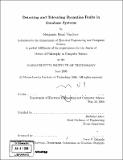Detecting and tolerating Byzantine faults in database systems
Author(s)
Vandiver, Benjamin Mead, 1978-
DownloadFull printable version (10.70Mb)
Other Contributors
Massachusetts Institute of Technology. Dept. of Electrical Engineering and Computer Science.
Advisor
Barbara Liskov.
Terms of use
Metadata
Show full item recordAbstract
This thesis describes the design, implementation, and evaluation of a replication scheme to handle Byzantine faults in transaction processing database systems. The scheme compares answers from queries and updates on multiple replicas which are off-the-shelf database systems, to provide a single database that is Byzantine fault tolerant. The scheme works when the replicas are homogeneous, but it also allows heterogeneous replication in which replicas come from different vendors. Heterogeneous replicas reduce the impact of bugs and security compromises because they are implemented independently and are thus less likely to suffer correlated failures. A final component of the scheme is a repair mechanism that can correct the state of a faulty replica, ensuring the longevity of the scheme. The main challenge in designing a replication scheme for transaction processing systems is ensuring that the replicas state does not diverge while allowing a high degree of concurrency. We have developed two novel concurrency control protocols, commit barrier scheduling (CBS) and snapshot epoch scheduling (SES) that provide strong consistency and good performance. The two protocols provide different types of consistency: CBS provides single-copy serializability and SES provides single-copy snapshot isolation. We have implemented both protocols in the context of a replicated SQL database. Our implementation has been tested with production versions of several commercial and open source databases as replicas. Our experiments show a configuration that can tolerate one faulty replica has only a modest performance overhead (about 10-20% for the TPC-C benchmark). Our implementation successfully masks several Byzantine faults observed in practice and we have used it to find a new bug in MySQL.
Description
Thesis (Ph. D.)--Massachusetts Institute of Technology, Dept. of Electrical Engineering and Computer Science, 2008. Includes bibliographical references (p. 171-174).
Date issued
2008Department
Massachusetts Institute of Technology. Department of Electrical Engineering and Computer SciencePublisher
Massachusetts Institute of Technology
Keywords
Electrical Engineering and Computer Science.